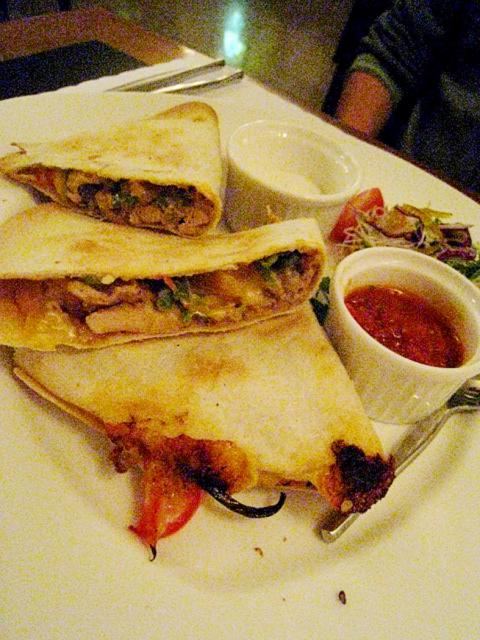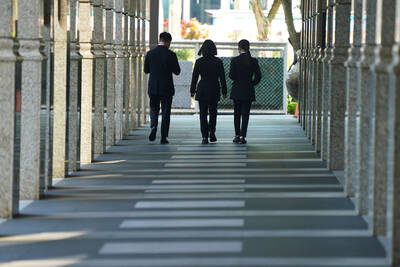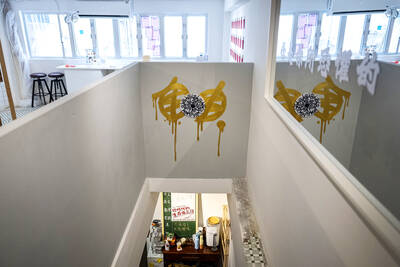Cafe Astoria is a living piece of Taipei history. Founded in 1949 by a Russian nobleman who arrived in Taiwan after having fled to China following the October Revolution, it was Taipei’s first Western-style patisserie. The restaurant on the second floor, a favorite with Faina Chiang Fang-liang (蔣方良), the Russian wife of former president Chiang Ching-kuo (蔣經國), became a hangout for the foreign community of the time.
Some of the dishes, such as the Russian borscht, have been on the menu since the cafe opened.
The patisserie on the first floor might easily be mistaken for a traditional Taiwanese-style bakery, and only closer inspection reveals that it sells a unique range of products, such as Russian soft candy, a kind of marshmallow with walnuts (NT$150 for a small packet), and the Mazurka (NT$55 a slice), a dense cake made with raisins, walnuts and dried longan (龍眼). In Astoria’s early days, ingredients like walnuts were difficult to procure, so local substitutes, such as longan, were used. Although it is certainly not authentically Russian, the cake has been a solid seller for over half a century, and is both tasty and unusual.

Photo: Ian Bartholomew, Taipei Times
A narrow staircase next to the bakery leads up to the restaurant. The walls are adorned with fascinating pictures of the restaurant’s early history. Inside is a haphazard display of photos from the 1960s, when Astoria became a gathering place for members of the artistic elite, such as writer Kenneth Pai (白先勇) and Cloud Gate Dance Theatre’s artistic director Lin Huai-min (林懷民).
The days when these young artists set out to put contemporary Chinese arts on the map are long over.
The dark wood paneling, white plaster molding and wall-side tables, each with their own dimmer-controlled lamp, all suggest aspirations to luxury and chic, and while the iceberg lettuce salad with thousand island dressing, which forms part of the set menu, might have been sophisticated in Taipei 20 years ago, it certainly isn’t any more.
But at least the lettuce was crisp.
A tasty dark bread was served with the meal, but the presence of a fruit jam as part of the bread basket was more all-day breakfast than lunch or dinner set. And the cream of pumpkin soup was right out of a packet.
These came as part of the set menu option for the baked pancake with cheese, spice and chicken (NT$550). This was a kind of quesadilla that didn’t seem particularly Russian, though I was assured it was a house specialty. There was a home-cooked heartiness to the dish and what it lacked in presentation it made up for in generosity and flavor.
The Russian borscht (NT$200 for a small bowl, NT$580 for a set) seemed to offer the safety of tradition, though on arrival it proved to be far from authentic. Despite the presence of an incongruous ear of baby corn and a wholly inadequate serving of sour cream, this was exceedingly good and contained an ample portion of tender diced beef. The soup was served in a lovely little white china tureen, and it was unfortunate that the rim was spattered with soup and had not been wiped down. As with the pancakes, generous portions and the hearty flavor triumphed over presentation.
The quality of the service was mixed, with the floor manager being extremely chatty and informative, while the servers were on the whole just getting on with the job.
Cafe Astoria, despite its Russian past, should probably not be described as a Russian restaurant. Though it has made too many concessions to local tastes over the decades, what remains is unique and interesting.
If viewed from a purely culinary perspective, there is quite a lot wrong with Cafe Astoria. But the place is so full of history, it is easy to overlook the negatives and get caught up in the zeitgeist of times past.

Taiwan’s politics is mystifying to many foreign observers. Gosh, that is strange, considering just how logical and straightforward it all is. Let us take a step back and review. Thanks to the Chinese Nationalist Party (KMT) and the Taiwan People’s Party (TPP), starting this year people will once again have Christmas Day off work. In 2002, the Scrooges in the Democratic Progressive Party (DPP) said “bah, humbug” to that. The holiday is not actually Christmas, but rather Constitution Day, celebrating the enactment of the Constitution of the Republic of China (ROC) on December 25, 1947. The DPP and the then pan-blue dominated legislature

If you’ve lately been feeling that the “Jurassic Park” franchise has jumped an even more ancient creature — the shark — hold off any thoughts of extinction. Judging from the latest entry, there’s still life in this old dino series. Jurassic World Rebirth captures the awe and majesty of the overgrown lizards that’s been lacking for so many of the movies, which became just an endless cat-and-mouse in the dark between scared humans against T-Rexes or raptors. Jurassic World Rebirth lets in the daylight. Credit goes to screenwriter David Koepp, who penned the original Jurassic Park, and director Gareth Edwards, who knows

Focus Taiwan reported last week that government figures showed unemployment in Taiwan is at historic lows: “The local unemployment rate fell 0.02 percentage points from a month earlier to 3.30 percent in May, the lowest level for the month in 25 years.” Historical lows in joblessness occurred earlier this year as well. The context? Labor shortages. The National Development Council (NDC) expects that Taiwan will be short 400,000 workers by 2030, now just five years away. The depth of the labor crisis is masked by the hundreds of thousands of migrant workers which the economy absolutely depends on, and the

It’s been years since mass arrests all but silenced pro-democracy activism in Hong Kong. But a crackdown on dissent in the semiautonomous Chinese city is still expanding, hitting restaurants, bookstores and other small businesses. Shops and eateries owned by people once associated with the largely subdued pro-democracy movement are feeling a tightening grip through increased official inspections, anonymous complaint letters and other regulatory checks. Those critical of the city’s political changes say it’s a less visible side of a push to silence dissent that began five years ago when Beijing imposed a national security law to crush challenges to its rule, under